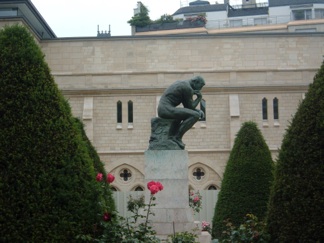

Detailed Course Syllabus
=> Always bring to class both volumes of the Barnes edition of The Complete Works of Aristotle. <=
Additional secondary source readings for each PART (and particularly for PART 3) will be suggested in class or via email during the semester.
PART 1 of 3. Reading Aristotle.
8/29 Aristotle’s Categories.
Required readings: (1) Aristotle, Categories, ch.1-5; (2) (i) “Categories” in MEP and (ii) “Categories of Being” in NCE, and (iii) “Aristotle” in NCE.
Suggested reading: Plato, Sophist 251A-B, 253D, 262E ff.
8/31 Aristotle’s Categories.
Required readings: (1) Aristotle, Categories, ch.1-5; (2) (i) “Aristotle” in MEP and (ii) “Aristotle” in REP.
9/05 Language and logic: Aristotle’s On Interpretation and Prior Analytics.
Required readings: (1) On Interpretation, ch. 1-9 & 11; (2) Prior Analytics 1.1, 1.29 45b36 - 1.32 47a9 & 2.21; (3) Plato, Meno 81B-86B & 98A. Those unfamiliar with Plato’s doctrine of recollection should read Phaedo 72e ff. for a classic account, though the account in the Meno is surely earlier.
For this class and the 3 that follow, also read “Aristotle’s Logic” by Robin Smith in the Stanford Encyclopedia of Philosophy. http://plato.stanford.edu/entries/aristotle-logic/.
Suggested: S. Marc Cohen has a valuable handout on Aristotelian Syllogistic on the web at:
9/07 Aristotelian Demonstrative Science: Aristotle’s Posterior Analytics.
Required readings: (1) Posterior Analytics 1.1-11, 1.13-14; (2) “Demonstration” in NCE.
9/12 Aristotelian Demonstrative Science: Aristotle’s Posterior Analytics, continued.
Required readings: (1) Posterior Analytics 1.31-34; 2.1-4, 2.19.
Suggested for those interested: There is an interesting piece on Ancient Logic by Susanne Bobzien (2005) in the NDHI.
9/14 Aristotelian Natural Science or Physics: Aristotle’s Physics.
Required readings: (1) Physics 1: establishing the principles of natural philosophy;
(2) “Aristotle’s Natural Philosophy” by Istvan Badnar in the Stanford Encyclopedia of Philosophy. http://plato.stanford.edu/entries/aristotle-natphil/
9/19 Aristotelian Natural Science or Physics: Aristotle’s Physics.
Required readings: (1) Physics 2.1-4: nature, method, causality; (2) Metaphysics 5.1-4: archê, aition, stoicheion, phusis; (3) “Aristotle on Causality” by Andrea Falcon http://plato.stanford.edu/entries/aristotle-causality/
9/21 Aristotelian Natural Science or Physics: Aristotle’s Physics.
Required readings: (1) Physics 2.5-9: chance, teleology, necessity, et alia.
9/26 Aristotelian Natural Science or Physics: Aristotle’s Physics.
Required readings: Physics 3.1-3: motion. Secondary source readings TBA.
9/28 Aristotelian Natural Science or Physics: Aristotle’s Physics.
Required Reading: Physics 8. Suggested Reading: Physics 7. Secondary source readings TBA.
10/03 Dr Susanne Foster on Aristotle’s Nicomachean Ethics.
10/05 Exam #1 (20% of course grade)
10/10 Aristotle’s Metaphysics
Required Reading: (1) Metaphysics 1.1-4; (2) “Aristotle’s Metaphysics” by S. Marc Cohen in the Stanford Encyclopedia of Philosophy. http://plato.stanford.edu/entries/aristotle-metaphysics/
Suggested reading: Metaphysics 1.5-10.
10/12 Aristotle’s Metaphysics
Required Reading: Metaphysics 2. Secondary source readings: Owens, The doctrine of being in the Aristotelian Metaphysics; a study in the Greek background of mediaeval thought. This book is on Reserves at Raynor Library.
10/17 Aristotle’s Metaphysics
Required Reading: Metaphysics 3.
PART 2 of 3: Exercises in seminar presentation.
In this part of the course teams of two students will work together on a presentation of the key issues in the relevant texts. Students are expected to work with the Instructor in preparing this assignment.
Presentations will be allotted 30-35 min. class time. (1) Before the preceding class presenters must email to the Instructor a hierarchical outline of the presentation to be made. The Instructor will then convey that outline to the rest of the class via email. (2) Each non-presenting student in the course is required to bring to class at least 15 copies of a sheet with two written questions on the presentation and the texts of Aristotle. These questions must also be sent to the Instructor via email as a record of student participation.
After the presentation, the floor will be open for discussion based on the prepared student questions.
10/19 Aristotle’s Metaphysics 4. The Science of Being qua Being.
Required reading: Metaphysics 4.
Presentation: The presentation should focus for the most part of chapters 1-4 and contain a brief explanation of how the discussion that follows in 5-8 is related.
Presenters: XXX
Presentation outline due to Instructor: before class on 10/17 via email.
Student questions due to Instructor via email before class on 10/19.
10/24 Aristotle’s Metaphysics 6. First Philosophy, senses of being, accidental being, being as true.
Required reading: Metaphysics 6.
Presentation: The presentation should focus for the most part on chapter 1 and explain how the remaining 3 chapters are related to the first.
Presenters: XXX
Presentation outline due to Instructor: before class on 10/19 via email.
Student questions due to Instructor via email before class on 10/24.
10/26 Aristotle’s Metaphysics 7. What is ousia (substance)?
Required reading: Metaphysics 7 & 8.
Presentation: The presentation should focus for the most part on chapters 1-3 but draw on other parts of Books 7 and 8 as necessary.
Presenters: XXX
Presentation outline due to Instructor: before class on 10/24 via email.
Student questions due to Instructor via email before class on 10/26.
10/31 Aristotle’s Metaphysics 7. What is to ti ên einai (essence)?
Required reading: Metaphysics 7 & 8.
Presentation: The presentation should focus on the meaning of essence in Metaphysics 7, drawing on 8 as necessary.
Presenters: XXX
Presentation outline due to Instructor: before class on 10/26 via email.
Student questions due to Instructor via email before class on 10/31.
11/02 Aristotle’s Metaphysics 9. dunamis and energeia (potentiality and actuality)
Required reading: Metaphysics 9.
Presentation: The presentation should explicate Aristotle’s conceptions of potentiality and actuality as discussed in this book, extracting and discussing the key aspects and uses of these notions.
Presenters: XXX
Presentation outline due to Instructor: before class on 10/31 via email.
Student questions due to Instructor via email before class on 11/02.
11/07 Aristotle’s Metaphysics 12. Arguments for the Unmoved Movers and their natures.
Required reading: Metaphysics 12.
Presentation: The presentation should explicate Aristotle’s arguments in chapter 6 & following closely and carefully, using available commentaries on Aristotle.
Presenters: XXX
Presentation outline due to Instructor: before class on 11/02 via email.
Student questions due to Instructor via email before class on 11/07.
11/09 Prof. Andreas Speer, Thomas Institut, Cologne, on Wisdom in Ancient and Medieval Philosophy
PART 3 of 3: A Mini Conference on Aristotle’s Peri Psyches / De Anima (Psychology).
In this part students will prepare and present short papers on selected topics in Aristotle’s De Anima. It is my intention that these will be drafts of the final course paper (40% of the course grade) and that final course papers will be substantially improved through classroom discussion and private consultations with me following classroom presentations.
Papers should be ca. 15 pp. with footnotes or endnotes. Each paper will have a student commentator with open discussion to follow. Presenters must email the paper to the Instructor before the start of the class just prior to the date of the presentation.
Classroom presentations will be allotted a total of 35 min. each. The presenter will focus on the most important parts of the paper for classroom discussion and will work from a 3 page outline. The presenter will bring copies of this for distribution to each class member and will email the outline to the Instructor before the start of the class. The commentator will bring copies of his/her commentary for distribution to each class member and will email a copy to the Instructor before the start of the class. The presenter will have 15 min. to present; the commentator will have 6 min. to comment and raise questions and issue; the remaining 14 min. will be open class discussion. Students not presenting or commenting must bring two questions or comments on a single page for distribution to each class member. These students will email copies of these questions or comments to the Instructor before the start of class.
In this way we will have a mini conference on selected topics in the De Anima with papers, commentary, questions or comments from participants, and general discussion.
11/14 De Anima. One presentation.
XXX. Presentation 1: What is the science of the soul? How does it fit into the division and the hierarchy of the sciences? What method is used in the study of the soul? De Anima 1.1.
Required readings: De Anima 1. Comment: XXX
10:15-10:50: Prof. Taylor on De Anima 1.1.
Due dates:
11/09: Presenter emails paper (ca. 15 pp.) to Instructor for distribution to the class.
11/14: Before class: The commentator emails the comments to the Instructor and students not presenting email their comments or questions to the Instructor.
The presenter emails the outline for class to the Instructor.
11/14: At class: The presenter distributes copies of the outline of the presentation to each class member. Then the presenter presents discuss of the ke issues of the paper in 15 min.
The commentator distributes copies of the comments to each class
member and speaks for up to 6 min.
The students not presenting distribute a copy of questions or
comments to each class member.
11/16 De Anima. Two presentations.
XXX. Presentation 2: The Definition of soul. What is the soul? How is it related to the body? Precisely how is it defined? What is hylemorphism? Commentator: XXX
Required readings: De Anima 2.1-2
XXX Presentation 3: The powers of the soul. Why is nutrition important here? Is it possible for there to be a unified science of the soul? How is 'living' predicated? De Anima 2.3-4.
Commentator: XXX. Required readings: De Anima 2.
Due dates:
11/11: Presenter emails paper (ca. 15 pp.) to Instructor for distribution to the class.
11/16: Before class: The commentator emails the comments to the Instructor and students not presenting email their comments or questions to the Instructor.
The presenter emails the outline for class to the Instructor.
11/16: At class: The presenter distributes copies of the outline of the presentation to each class member. Then the presenter presents discuss of the key issues of the paper in 15 min.
The commentator distributes copies of the comments to each class
member and speaks for up to 6 min.
The students not presenting distribute a copy of questions or
comments to each class member.
11/21 De Anima. Two presentations.
XXX. Presentation 5: Again, what is sensation? De Anima 2.12. Required readings: De Anima 2. Commentator: XXX
XXX. Presentation 6: What are the common sensibles and how are they apprehended? De Anima 3.1. Commentator: XXX
Required readings: De Anima 3.
Due dates:
11/16: Presenter emails paper (ca. 15 pp.) to Instructor for distribution to the class.
11/21: Before class: The commentator emails the comments to the Instructor and students not presenting email their comments or questions to the Instructor.
The presenter emails the outline for class to the Instructor.
11/21: At class: The presenter distributes copies of the outline of the presentation to each class member. Then the presenter presents discuss of the key issues of the paper in 15 min.
The commentator distributes copies of the comments to each class
member and speaks for up to 6 min.
The students not presenting distribute a copy of questions or
comments to each class member.
11/23Thanksgiving. No class.
11/28 De Anima. Two presentations.
XXX. Presentation 7: Awareness and the unity of what perceives. De Anima 3.2.
Required readings: De Anima 2. Commentator: Luke
XXX. Presentation 8: What is Aristotle's understanding of imagination? De Anima 3.3.
Required readings: De Anima 3. Commentator: Nathan
Due dates:
11/23: Presenter emails paper (ca. 15 pp.) to Instructor for distribution to the class.
11/28: Before class: The commentator emails the comments to the Instructor and students not presenting email their comments or questions to the Instructor.
The presenter emails the outline for class to the Instructor.
11/28: At class: The presenter distributes copies of the outline of the presentation to each class member. Then the presenter presents discuss of the key issues of the paper in 15 min.
The commentator distributes copies of the comments to each class
member and speaks for up to 6 min.
The students not presenting distribute a copy of questions or
comments to each class member.
11/30 De Anima. Two presentations.
XXX. Presentation 9: How is thinking like and unlike sense perception? De Anima 3.4.
Required readings: De Anima 3. Commentator: Arlie
XXX. Presentation 10: What of the object of thought? How do a thing and its essence differ? If everything is thinkable, why is it not necessary that all things think? De Anima 3.4. Commentator: XXX.
Required readings: De Anima 3.
Due dates:
11/25: Presenter emails paper (ca. 15 pp.) to Instructor for distribution to the class.
11/30: Before class: The commentator emails the comments to the Instructor and students not presenting email their comments or questions to the Instructor.
The presenter emails the outline for class to the Instructor.
11/30: At class: The presenter distributes copies of the outline of the presentation to each class member. Then the presenter presents discuss of the key issues of the paper in 15 min.
The commentator distributes copies of the comments to each class
member and speaks for up to 6 min.
The students not presenting distribute a copy of questions or
comments to each class member.
12/05 De Anima. De Anima 3.5 and its interpretations.
Taylor lecture on Potential and Active Mind. De Anima 3.5, and its various interpretations.
Required readings: De Anima 3.5.
12/07Taylor lecture on the latter parts of the De Anima and later influence and importance of the De Anima; Student evaluations
12/15Course Final Exam 8-10 am

Course Syllabus



